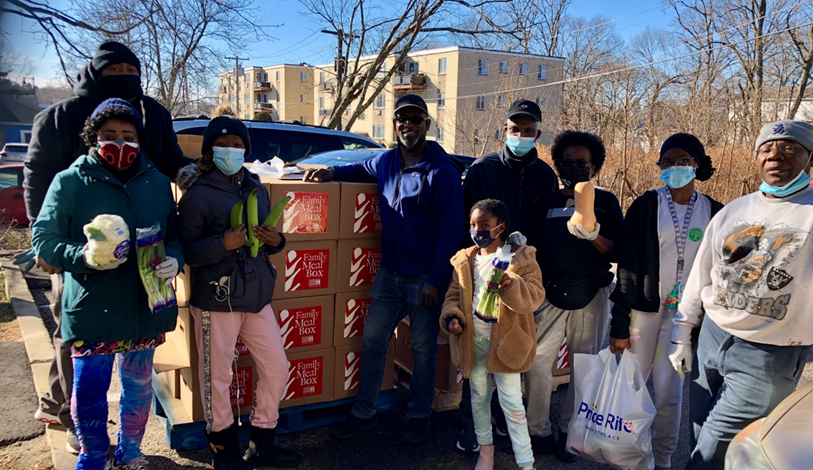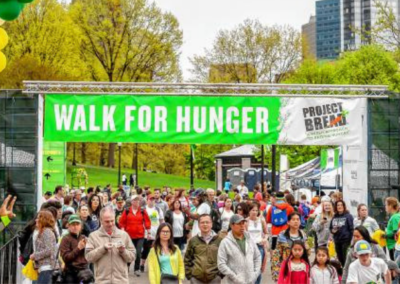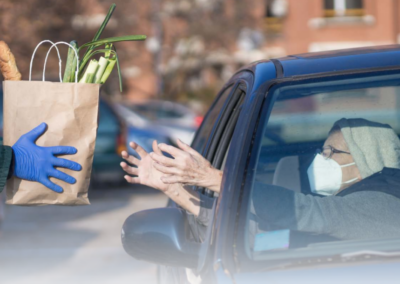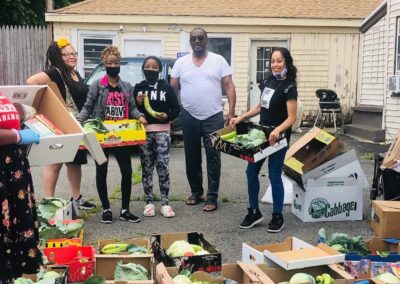Boston Communities’ Roadmap to Redesign Food Security

When it comes to addressing food insecurity, meaningful involvement and decision-making by community members, including those most affected by food access challenges, is often overlooked. Leadership by those who understand these challenges and barriers to food security firsthand creates a faster path to more effective solutions designed by those who already know what works to enact meaningful and systemic change.
Sparked by increasing food insecurity as a result of the pandemic, Health Leads conducted The Equitable Boston Food Ecosystem (EBFE) community engagement process and brought together over 100 Boston community residents and stakeholders including: community-based organizations, faith-based organizations, mutual aid programs, academic institutions, health care facilities, and local government staff to assess current food resources and needs in Boston. The Mayor’s Office of Food Justice (OFJ) used the information gathered from the community process and report recommendations to create the 2021-2023 Food Access Agenda.
A key recommendation of the EBFE report was the call for more localized and neighborhood specific community-owned solutions to improve food security, and as a result, the Neighborhood Food Action Collaborative (NFAC) was born. NFAC uses a hyper-local, community-led approach to design equitable solutions that address food insecurity while tackling disparities for residents in Boston. The NFAC’s first two community groups, Hyde Park/Roslindale and Dorchester/Mattapan/ Roxbury, aim to create a more robust, accessible, and equitable food ecosystem in Boston. Efforts started on day one to ensure they transferred full ownership to community members and local organizations for a sustainable, culturally connected and linguistically appropriate effort that can address both food insecurity and economic empowerment.
Within months of coming together, NFAC:
- Supported the increase of fresh produce at four food distribution sites;
- Created a new food distribution site in a neighborhood identified by the city as low-resourced;
- Developed a comprehensive food resource guide that’s updated weekly;
- Established a virtual community for neighborhood residents to engage in the solution-design and have their voices and needs heard;
- Improved collaboration and coordination among resident groups, CBOs, health and government systems;
- Created direct access for food producers to community food programs.
Two community members in the Hyde Park/Roslindale NFAC group co-lead efforts in collaboration with a Health Leads staff member. Ricardo Henry, one of the NFAC community leaders, is a long-time Hyde Park resident with deep roots in community organizing and has personally seen the way food insecurity has impacted his community during the pandemic. As a leader of NFAC, he has brought his own lived-experiences and ideas for food system improvements while uplifting the voices of others to create actionable changes in Hyde Park.
“In my past organizing work in Boston and Hyde Park, I got very frustrated,” says Henry. “We would talk a lot with community members and get buy-in, but actually moving work forward to action was so difficult. Here with NFAC it is different. We are putting in work and we are seeing results because this group has community members, local organizations, and Health Leads, who can support us in making change. Our voices are heard loudly, and we are at the forefront of all decision-making.”
The NFAC is now working on an initiative to expand SNAP awareness and enrollment for those attending the weekly food distribution programs by offering enrollment incentives, individualized education, and application assistance by trained community members. This is part of a larger state-wide effort to close the SNAP Gap, which refers to the over 700,000 MassHealth recipients (pre-pandemic) who are likely eligible for SNAP but are not receiving these important hunger-preventing benefits.
What Did We Learn?
Throughout this process, we have learned that the road to community-ownership and empowerment takes time. Strategies that address and mitigate power dynamics – raising the voice and influence of community members and creating space for true partnership requires thoughtful engagement, time, and intentionality to allow for a truly collaborative approach, especially when working with under-resourced and marginalized communities that are often surveyed and interviewed without seeing a return on their expertise and input.
Sophia Michel, NFAC member and resident of Roslindale, explains that “there has always been a need for more inclusion and support for families in Hyde Park & Roslindale who are facing food insecurity and want to be a part of the solution. This group makes everyone feel respected and included – our voices are heard.”
Other members have noted that, unlike other community input work, this current effort changes power dynamics and makes the community members the experts, with community organizations serving in a supporting role. This disrupts the bureaucracy of organizations and allows the NFAC to adapt and react quickly when community needs and priorities change. Elevating those who understand the challenges and barriers to food security first-hand can mean solutions by those who already know what works to enact change.
Interested in learning more about our work in Boston? Are you advocating for increased food security in your community? Let’s talk!




